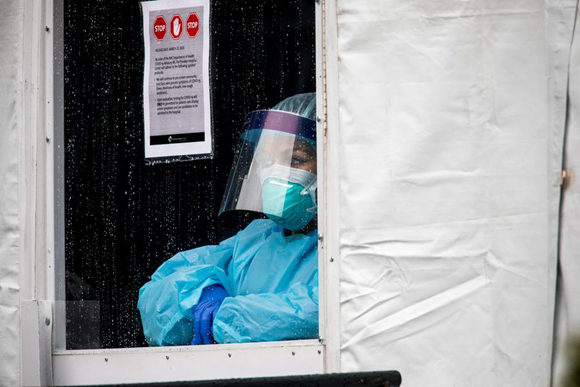
A healthcare worker looks out of the window of a tent in front of Brooklyn Hospital Center in the Brooklyn borough of New York, the United States, on April 24, 2020. [Photo/Xinhua]
It's fair to say that research into the origins of COVID-19 is a long and time-consuming process, and scientists need to be given sufficient time to reach the final answer.
World Health Organization (WHO) Director-General Tedros Adhanom Ghebreyesus issued this warning at a news conference in Geneva on April 20, saying lack of international solidarity was contributing to the current pandemic.
"Don't use this virus as an opportunity to fight against each other or score political points. It's dangerous. It's like playing with fire," he said, pointing out that without national unity and global solidarity, the worst is yet "ahead of us."
Throughout human history, various viruses have always lurked. Although the level of human science and technologies is constantly improving, sometimes we are still helpless in the face of viruses. This time, the outbreak of COVID-19 is proving to be a fierce enemy. It's very rare in a century for such a rapid spread of illness with widespread and profound impact.
Where does this current virus come from? What evolution has it undergone? Everyone wants to know the answers. Though we may not get them any time soon, I believe that the world will eventually get at the truth.
Let professionals do their job. Scientific problems will always need to be solved by scientists. This is a common sense. This is why the Office of Science and Technology Policy in the White House sent a letter to the National Academies of Sciences, Engineering, and Medicine (NASEM) as early as February, requesting it to rapidly examine the information and solicit opinions from scientists to help determine the virus origins.
But strange thing happened, when the source tracing studies became politicalized, that is because, it is difficult to really wake those pretending to be asleep.
Tracing the coronavirus's origins is the responsibility of the global community of scientists that cannot be passed on to others. Yet, scientists are not omnipotent, because virus origins tracing research is not an exact science with overnight results.
Dr. Richard Y. Zhao, fellow of the American Academy of Microbiology and a virologist at the University of Maryland, pointed out that virus origins tracing research is a scientific challenge filled with great uncertainty. Scientists need to undertake an epidemiological survey, genomic analysis, host (intermediate host and natural host) screening and identification, field sampling, homology research on isolated virus strains, and final bioinformatics analysis and identification. Only after all these steps have been completed can they track back to the origins of a virus.
So, it's fair to say that the virus origins research is a long and time-consuming process, and scientists should be given sufficient time to undertake their duties. Currently, there are many scientists all over the world conducting scientific research on this virus, and origins trace research is naturally a key task. Yet, the research is still in its early stages. There's still a long way to go before coming up with some answers.
There's a recent update of a significant research achievement: COVID-19 is the product of natural evolution, according to findings by six scientists including Kristian Andersen, an associate professor of immunology and microbiology at Scripps Research, Robert F. Garry of Tulane University, Edward Holmes of the University of Sydney, Andrew Rambaut of University of Edinburgh, and the noted "virus hunter" W. Ian Lipkin of Columbia University.
Their paper was published on March 17 in the journal Nature Medicine. The analysis of public genome sequence data from the virus and related viruses found no evidence that it was made in a laboratory or otherwise engineered.
As the global pandemic worsens, it is very important to take scientific and decisive measures to prevent and control the virus with a scientific attitude. Exploiting the virus and the pandemic as political tools not only does not help in the prevention and control, but also will backfire, causing more serious consequences.
For this reason, many scientists around the world have called for a scientific attitude to treat the pandemic, to promote scientific argumentation, and to promote international cooperation. Under the circumstances that many normal scientific research activities in the world have been severely affected by it, the cooperation between countries, especially among scientists, is even more precious.
As stated in NASEM's reply to the request from the Office of Science and Technology Policy of the White House, international scientific collaboration, which is already occurring, is more important than ever in addressing these research questions and overcoming global challenges such as the current outbreak.
Content in partnership with Science and Technology Daily.


